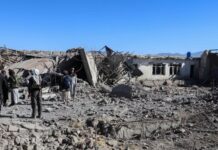GILGIT, Aug 04 (Alliance News): Prime Minister Shehbaz Sharif on Monday expressed deep concern over the devastation caused by recent heavy rains in Gilgit Baltistan, which led to loss of life and severe damage to infrastructure.
During his visit to the flood-affected region, the premier emphasized the urgent need for climate action, reiterating that Pakistan remains on the frontline of climate-induced disasters despite its negligible contribution to global carbon emissions.
While speaking to media, PM Shehbaz stated, “I regret the loss of life and property due to the rains. Every year, we suffer due to climate change.
Measures to address these challenges are the need of the hour.” Referring to the catastrophic 2022 floods, the prime minister said he had instructed the Ministry of Climate Change to actively develop strategies to mitigate future disasters and promote infrastructure resilience.
The PM reviewed the devastation caused by cloudbursts and flash floods in Diamir, Chilas, Skardu, Babusar, and adjoining regions.
He also chaired a high-level meeting where he was briefed on the losses incurred due to landslides and rising water levels.
The premier directed all relevant authorities to expedite relief, rehabilitation, and infrastructure rebuilding efforts.
Highlighting Pakistan’s role as a victim rather than a contributor to climate change, the prime minister pointed out, “Despite our near-zero emissions, Pakistan ranks among the top ten countries most affected by climate change.”
He stressed the importance of robust participation in international climate summits and pushed for securing global financial support for climate resilience.
Earlier in the day, PM Shehbaz was received by GB Governor Mehdi Shah and Chief Minister Gulbar Khan.
He was accompanied by Minister for Communications Abdul Aleem Khan, Information Minister Attaullah Tarar, Minister for Kashmir and GB Affairs Amir Muqam, Minister for Climate Change Dr Musadik Malik, and Adviser Rana Sanaullah.
The delegation was briefed on the region’s flood situation, ongoing development projects, and the law and order landscape.
The Prime Minister also announced the establishment of Daanish Schools in Gilgit Baltistan to provide quality education to the underprivileged children of the region.
As part of rescue operations, over 200 stranded tourists were successfully evacuated by the Pakistan Army and civil authorities after landslides cut off major routes, including segments of the Karakoram Highway.
Tragically, at least six people were killed in Babusar Valley after sudden flash floods swept away vehicles and tourists. A 14-day search operation ended without locating the missing persons. “Hopes of finding the missing who were swept away have extinguished,” GB government spokesperson Faizullah Faraq said.
Meanwhile, GB is bracing for another spell of torrential rains. The Pakistan Meteorological Department (PMD) warned that from Monday through August 7, Azad Jammu and Kashmir and Gilgit Baltistan could face widespread heavy rainfall and cloudburst incidents.
According to the Met Office, July 2025 saw 23% more rainfall than average, with GB receiving 20.20mm of rain—a 52% increase.
During the visit, Uneesa Saeed, a social impact strategist working in disaster-prone regions, emphasized the need for long-term climate adaptation strategies. “We can no longer treat these floods as isolated events.
There is an urgent need to institutionalize climate resilience within our development framework,” she said while addressing a briefing with officials and local NGOs.
Safa Gul, a youth climate advocate who has been mobilizing community awareness campaigns in the northern regions, stressed the role of local communities in climate response.
“From early warning systems to sustainable tourism practices, local participation is key. The government must invest in training and tools that empower our mountain communities,” she said.
Their interventions were well-received by the Prime Minister, who assured that voices from civil society, especially women and youth leaders, would be included in future climate policymaking.
As Pakistan continues to face the wrath of unpredictable monsoons, stakeholders from across the public and private sectors are calling for bold climate leadership.
The premier’s visit to Gilgit Baltistan underscored not just the urgency of rescue and recovery but also the critical need for proactive, climate-smart planning to prevent such tragedies in the future.






